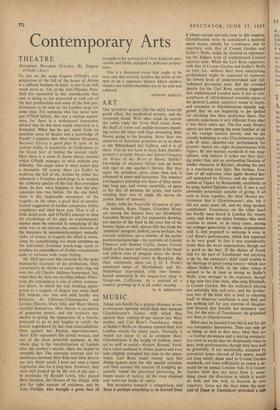Contemporary Arts
THEATRE
To put on the stage Eugene O'Ncill's vast adaptation of the fall of the house of Atreus is a difficult business in itself; to put it on well much more so. Yet, at the Arts Theatre. Peter Hall has succeeded in this considerable feat and, in doing so, has presented us with one of the best productions and some of the best per-. formances to be seen on the London stage for some time. For someone who has never seen any O'Neill before, this was a curious experi- ence, for there is a widespread impression abroad that he has been much overrated as a dramatist. What has he got, apart from an excellent sense of theatre and a knowledge of Freud? I suppose that what makes Mourning Becomes Electra a good play in spite of its various faults, is essentially its faithfulness to the Greek way of feeling the ancient myth Here there is a sense of doom always present, which O'Neill manages to seize without any difficulty. His tragic sense is what makes him a dramatist. Of course, there are faults; to motivate the fall of the Atrides by rather too schematic a Freudian psychology is to weaken the arbitrary quality of the fate that overtakes them. In fact, what happens is that the play separates into two halves. On the one hand. there is the implacable movement of the tragedy; on the other, a good deal of unsatis- factory suggestion of mother complexes, father complexes and what have you. That is all a little dated now, and O'Neill's attempt to base the psychology of his play on contemporary science must be tolerated in something of the same way as we tolerate the comic doctrine of the humours in seventeenth-century comedy. Only, of course, in tragedy the effect is worse, since, by concentrating too much attention on the individual, Freudian psychology tends to produce an atmosphere of Gothic romanticism quite at variance with tragic feeling.
Mr. Hall gets over this obstacle by the quiet implacable character of his production. Only occasionally do shrieks or pistol shots ring out over the old Charles Addams homestead, but, when they do, they arc startling indeed. Other- wise, the atmosphere is one of silent, remorse- less doom, in which the sick loathing appro- priate to a tragedy of disgust can make itself felt without any fuss and with hardly any hysterics, As Christine/Clytemnestra and Lavinia/Electra, Mary Ellis and Mary Morris excelled .themselves. Miss Morris is an actress of gruesome power, and she certainly suc- ceeded in giving the impression of a fanatic, prepared to go to any lengths to satisfy the hatred engendered by her own contradictions.
Over against her Puritan remorselessness, Mary Ellis represents the carnal woman, and one of the most powerful moments in the whole play is the transformation of Lavinia after her mother's suicide, when she begins to resemble her. The alternate contrast and re- semblance between Miss Ellis and Miss Morris are very finely acted. I have not seen a more impressive duo for a long time. However, they
were well backed up by the rest of the cast—
in particular by Ronald Lewis, who played Orin Mannon, the Orestes of the trilogy, with just the right amount of craziness, and by John Phillips, who brought a great deal of strength to his portrayal of New England puri- tanism and libido mingled in judicious propor- tions.
This is a theatrical event that ought to be seen and that entirely justifies the claim of the Arts to be a repertory theatre where modern classics not visible elsewhere are to be seen and admired.
ANTHONY HARTLEY


































 Previous page
Previous page